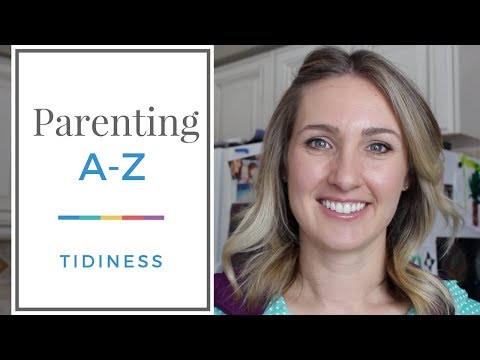
Hey hey, my friend! Welcome to Parenting A to Z! I'm Kelly Bourne and this week we're diving right into tidiness — how to get our kids to clean up after themselves! I know it can just be such a stress sandwich, can't it?! So I've got some really great tips on how to deal, kind of split in two — I've got some tips for the set dealing with kids under age 5 or 6 or so, and then I've got some tips on how to deal for the older kids as well So grab your cup of coffee and we'll get right to it! So what's the big deal with tidiness? Well, I think first and foremost, the thing that really gets us off the top, is just the sheer mess of things, right?! When we clean something up and two seconds later everything is a disaster
Like literally, out of the corner of my eye right now I can see a stack of blankets in our living room that I clean that up right after breakfast that is now spread all over the floor So it can get a little tiring constantly cleaning up the messes And not to mention, I think one of the bigger issues is the effect it can have on our relationships, and how the constant battles and the constant fighting can really put a strain on on our relationship So diving right into some tips on how we can alleviate not only the the mess factor, but also kind of do some relationship repair and stop the fighting, and stop the battles, some tips for our under-fives I think the first thing, and I know I'm so guilty of this myself, is just doing a little audit of how much stuff they have
How many toys they have Because it is really hard — it is next to impossible! To keep a tidy area, or a tidy living room, or a tidy bedroom, if you are drowning in toys and drowning in stuff It just it all gets to be a little bit much Heck, just even think of us in our adult lives I swear minimalism and and cutting back, and clawing back on things is such a huge trend right now, because we're more stressed out than ever, we're busier than ever, and having all of this "stuff" and needing everything to have its place, can get really overwhelming
And it's no different with our kids So just kind of step back and do a little audit Maybe there's too many things Maybe the answer is actually stepping back from the toys just a little bit And then when it comes to actually getting them to pitch in and getting them to help out, I think one thing that a lot of times we can overlook, is that we need to show our kids how to do this
Sometimes we can fall into this trap of just wanting them to clean up or wanting them to be more tidy, without actually showing them how to do it, or joining them in the process, so they know where everything goes And you can even make it fun You can make it a race against a timer, you can use your imagination be creative But just do it *with* them Do it with them, especially for those in the under five set, especially with 18-month-olds, two-year-olds
Doing it with them, helping them out Because again, those two-year-olds can make one heck of a mess! They can be a complete tornado and turn a room upside down in two seconds So then cleaning that up on their own can just be too much It can be too overwhelming So that's where cutting back on the toys, first of all, will help you in those situations, but then helping them and joining in with them and kind of sending the message that we're a team, and we'll help each other out, will really go a long way
You can even divide it as to you pick up the yellow blocks and I'll pick up the red blocks or which toys do you want to do, involving them that way really really helps But just not forgetting that crucial step of showing them the ropes, and showing them where things go, and showing them how to organize Really teaching them those skills And I'm sure some of you are probably like, "yeah Kelly, that sounds really amazing, but that is not gonna fly in my house!" Or you've already tried it and your kids ignore you, or they just go to another room and make another mess somewhere else Oh it can be really stressful
So one thing that I found works really really well, as far as winning my kids cooperation for tidying up, is using a "when/then" statement This is works especially well in times of transition, where say the living room is a total disaster and it's it's time for snack, or it's time to go to the park, or it's time to do something fun, just a simple one-liner is: "When your toys are cleaned up, then I'll know you're ready for snack" "When your toys are cleaned up, then I'll know you're ready to go to the park" Tying the freedom with the responsibility The freedom to go on to the the next activity, or the next fun thing, with the responsibility of tidying up our toys before we do that
So "when/then" statements are honestly one of my magical — I just I love it! I absolutely love "when/then" statements It removes me from being the heavy, and it puts the choice in their hands If you're ready to do the next activity, if you're ready to move along and have fun, absolutely let's do it I'm totally ready — when your toys are cleaned up So "when/ then" statements are a total winner
And if you are still like, "Okay Kelly, yeah I tried that Okay it's not working Okay, like is there any hope! Is there any hope for my sanity and the cleanliness of my house?!" And yeah, there absolutely is! Because I think as far as offering our kids choices and trying to teach them responsibility and winning their cooperation, of course we're trying to build all those qualities and characteristics, but there is definitely a bit of a learning curve And we are the adults, we are still the parents We set the overall boundaries for the home
So again, something that worked really well when we run into this struggle in our family, if it's time to go to bed and there's still toys everywhere, nothing's getting cleaned up, we'll just sit down and talk to our kids about problem solving what we should do moving forward Talking about how dad and I aren't willing to tidy up the whole house every night from all the toys that you guys are playing with And one strategy that really worked for us was just proposing that okay, if you guys are gonna play with your toys, anything that doesn't get cleaned up before bedtime, dad and I will happily put it in a little box and we'll just pack it away for a week And then when the week is over we can we can go through and pull any toys that they were missing So this also ties back in with that first point, it's really a way of getting some of the toys and some of the unwanted clutter out
And then it also sends the message to them that, okay if I'm gonna play with this, I need to be responsible with it or it's going away And this isn't like a threat, it's nothing like that It's really a conversation with your kids This toy situation is an issue, this is what I am proposing, what do you think? And then you can kind of talk about it and go from there I'd love to hear how it goes, if you give that one a try
It's definitely worked for us And then, just moving forward a little bit, those are strategies that really work for some of our younger kids, but when we're dealing with older kids we need to put on a totally different hat Because they're at a different stage of their development If you start throwing when/then statements at them, or asking them if they want to clean up the purple pencil crayons or the yellow pencil crayons, you're gonna totally lose them So I think the first thing with our older kids, is just to recognize differing priorities
You may be a total neat freak, and you make your bed every day, and you have your underwear all lined up in a row, and they may not share that value with you And that's okay And I know sometimes, if that is a value for you and you are a perfectionist in that area and you like everything to be neat and tidy, it can it can feel nearly impossible to let that slide But just recognizing that we're all different, we all have different priorities, and if they want to throw all of their laundry in one drawer and just kind of pull through, like that's okay That is okay
It's not hurting anything Sometimes we need to just step back a little bit And another thing tying really closely to that idea, is just the idea of respecting our kids' private space Oh it's so hard It's one of those things that, it's the ultimate kick in the pants of parenting, when our kids are really little and they need us for everything, and they're on us, constantly touching us, and needing us, and all we want is space
And then as soon as our kids are ready for some space, or some privacy, all we want to do is like double down and bring them back closer, and have more control, wanting to be all up in their grill with everything that they're doing But when it comes to our kids' private space, like their bedrooms, I think we need to just step back and allow them to manage that space how they would like to manage it And I know for any of my Type A'ers out there, or neat freaks, it can feel really impossible But just allow them that space It doesn't mean that you become the maid! Uh-uh! No way! Because with freedom comes responsibility
With the freedom to have your private space and keep it however you like, also goes hand in hand with the responsibility of learning to wash your own sheets, and learning to do your own laundry, and taking on all of those responsibilities So just even, I'm thinking for my own life, like I could never lecture any teenager on keeping a tidy room or tell parents how to get your kids to keep a super tidy room, because my room was an absolute disaster! There were clothes everywhere, stuff everywhere But I knew where everything was! I was fine with it It didn't bother me And I also vacuumed my own room, and washed my own sheets, and did my own laundry, and it was fine
And it was fine I just shut the door My parents didn't have to look at it, and it was all good It was all good So sometimes I think we just need to take a little bit of breather, allow that private space, but then also use it as an opportunity to start handing over more of the responsibilities
Showing your kids how to do laundry, and showing your kids how to vacuum, and showing your kids how to wash their own windows, and all of that jazz It can all work out if all this fails, just shut the door! And of course, my last point for our older kids is the same as with our younger kids Is just really trying to avoid doing it for them Because if they're keeping a messy room and you're going in and tidying it, and you're dusting, and you're doing all those things, you're essentially robbing them of the chance to learn those skills on their own
To learn what it's like to maintain their own space And then also to deal with the consequences of, okay if I'm gonna maintain my space like a complete and utter pigsty, it's not really very inviting Mom or dad or my brothers or sisters, or my friends may not actually want to be spending time with me in here I can even remember having one of my girlfriends over in high school and her opening my door and just being like — this is what your room looks like?! And you do get the hint when your friends start to say like, I don't know if I actually want to be spending time in here And then it allows your teens the motivation to do it on their own, saving you from harping and nagging and just again, like bashing heads and having it hurt your relationship Like a couple of dirty pairs of sweatpants on the floor, or dirty plates, like is that really worth it? Sometimes we just we have to let things go And then finally, I feel like I should just add an overall disclaimer in here too, because if you're noticing that your kids' hygiene is really suddenly starting to slide, or their room is suddenly a disaster, or they're hiding out in their room and it's part of a broader behaviour change, definitely pay attention to that I think all of us parents have that intuition, we can kind of sense when our kid is just not concerned with having a clean room, versus when our kid is really stressed, or really upset, or really struggling with something
So if you're starting to notice a decrease in hygiene, or a messy room, or lack of interest in keeping things tidy where maybe they used to be really tidy, along with other behaviour changes, or changes in their school environment, or sporting environment, is just pay attention to those signals and seek help if you need it Because I don't want to kind of sweep it under the rug, I know all these like cleaning metaphors, but really, trust your gut Trust your intuition If you think this is part of a bigger issue and that your child is struggling with something, of course go to your doctor or mental health care professional Trust your gut, always
But I really hope that helps, guys I know it can be really tricky, especially if you're someone who likes the Legos to all be colour sorted, and the GI Joes to be all in a row, but we sometimes just have to back off Notice if we've got too much clutter, notice if our kids are overwhelmed with the sheer amount of toys, scale back if we need to, and just as our kids get a little bit older, start tying some of those freedoms with responsibilities, just kind of handing it over, stepping back, and just shutting the door! So of course, let me know what you think, I'd love to hear your questions or comments below And as always, if you're looking for more in-depth parenting resources and support, don't forget to join us in the Parent 'Hood! I hold regular office hours and absolutely love chatting with you and and helping you work through whatever issues you're you're currently working through as you raise your kids So enjoy, guys! I will see you in the next video!




